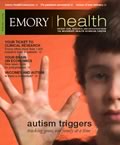Issues of teen intimacy
 Emory's Jane Fonda Center develops educational programs for teens to help them navigate the delicate waters of teen intimacy and sexuality. |
When to start talking about sex and what to say is not a simple issue.
From individual families to churches and schools, a debate swings between "too much too soon" or "too little too late."
Emory's Jane Fonda Center is working to get past the controversy by building programs that put an emphasis back on the core needs of young people, starting as early as the sixth grade.
Becoming sexual is evolutionary, involuntary, and inevitable, says the center's director Melissa Kottke.However, becoming a healthy sexual being is not. Today, we must start at younger ages than ever before to help young people make smooth transitions to adulthood."
The Fonda Center is approaching the challenge on multiple fronts, from sex education advocacy to partner violence prevention. It has developed a curriculum to reduce negative impacts of the media on adolescent sexual attitudes, a computer-based series to empower teens to protect reproductive health, and a summer training institute for Atlanta teen leaders.
Behind all these programs is the context that youth grow up in social environments rather than a vacuum. Adolescents are part of a mega-billion-dollar industry that markets to and portrays young girls as sex objects, says Marie Mitchell, the center’s program director. "That the media focuses on stimulation rather than education poses a real threat."
To help counter that negative influence, the center has developed a curriculum, Media Madness, with federal funding. The lessons help young people understand the media’s motivation to make money rather than portray real-life situations that can inform personal decisions. First piloted with 7th and 8th grade students in the Atlanta Public Schools, the program will be implemented in the 6th grade this fall and disseminated statewide.
"Sixth grade is a time when many youth start to swim in the much bigger pond of middle school," says Marion Howard, the center’s research director. "Not only are peers becoming more influential in their lives, they are left much more on their own to manage personal feelings and behaviors."
With a new grant from the Ford Foundation, the Fonda Center is conceptualizing a new framework for thought and action regarding sex education, which includes ways to partner with youth. Center staff are planning regional meetings among professionals interested in sex education and a nationwide youth retreat. The impetus behind the planning is to lay a foundation among young people for respect and responsible action, says Kottke. "Early on young people must learn to respect their bodies as well as their rights and the rights of others to be free from pregnancy and infection."
Another recent grant, from the Robert Wood Johnson Foundation (RWJF), allows the Fonda Center to teach youth how to develop healthy relationships and prevent intimate partner violence, a serious public health problem nationally and in Georgia. According to a 2007 report from the Georgia Department of Human Resources, one out of every six Georgia high school students was hit, slapped, or physically hurt on purpose by a boyfriend or girlfriend during the prior 12 months. The Fonda Center will offer the dating violence prevention program to 7th graders in the Atlanta Public Schools. The effort will be supported by a national social marketing campaign from the RWJF and multiple local agencies who are banding together to reduce teen dating violence.
As an ongoing effort, each summer the Fonda Center trains 60 Atlanta teen leaders from local high schools to deliver an abstinence curriculum to 8th grade classrooms, under the guidance of staff from Grady Hospital’s teen services.
"Young people exist along a continuum," says Kottke. "Each teen develops according to his or her unique timetable. We want to ensure that young people have sufficient preparation and guidance."
That’s why the Fonda Center is starting to help young people before too little is too late.
—Rhonda Mullen


